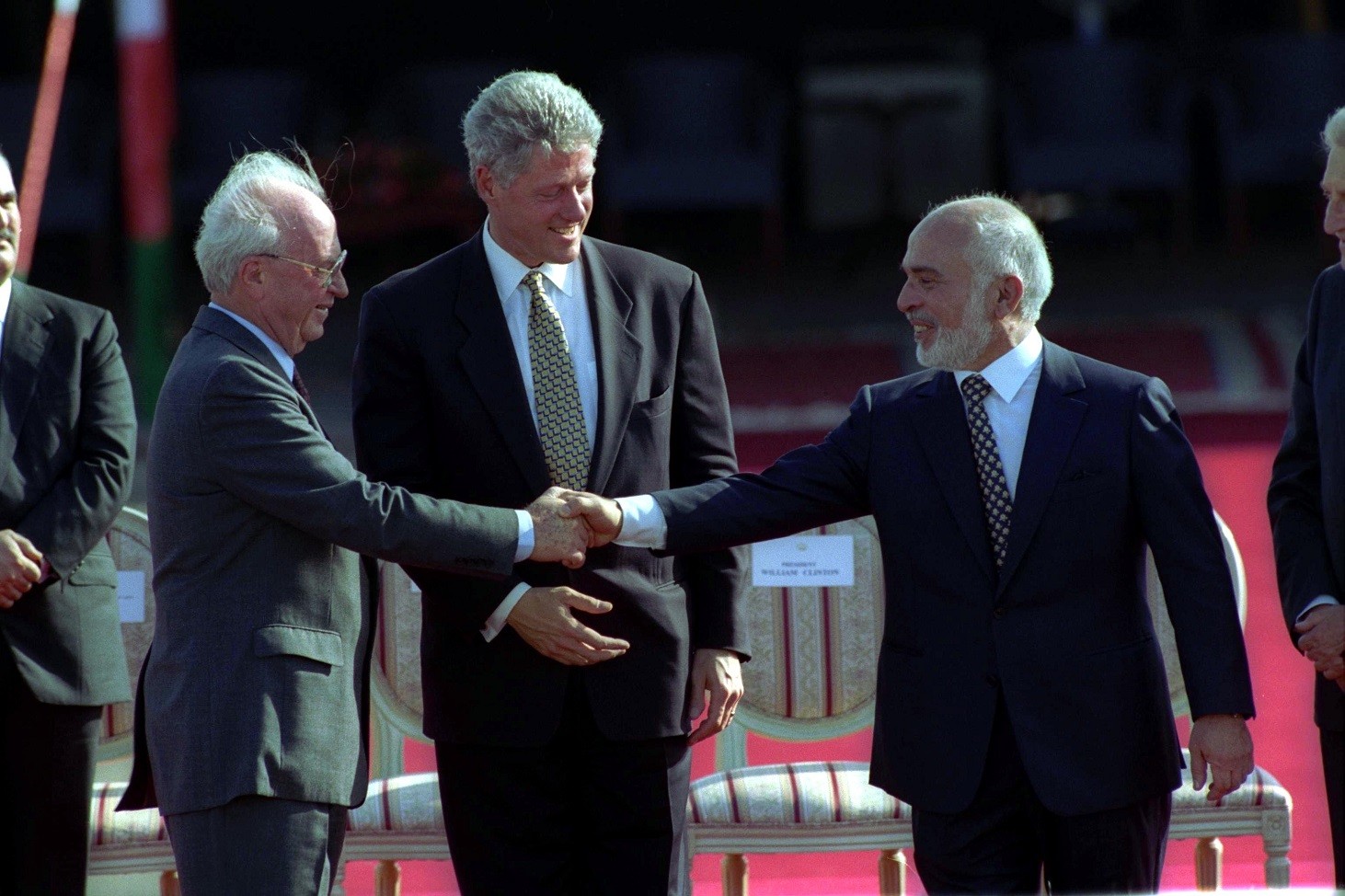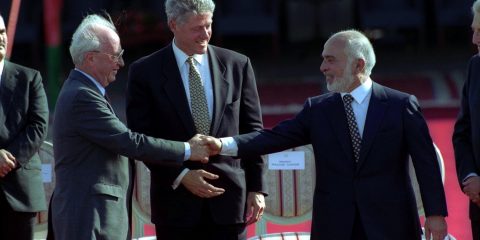It is a crucial accord, but needs attention and maintenance.
The Washington Agreement between Israel and Jordan in 1994, whose anniversary is this week, was the culmination of over thirty years of discreet engagement and cooperation, punctuated by periods of tension and conflict.
The relationship between Jordan and Israel is a strategic one. The two states share a long mutual border, but also a mutual pro-Western orientation, and, for decades and despite dramatic regional changes, very similar threat perceptions. The preservation and stability of Jordan’s Hashemite regime, borders and sovereignty, is a key component of Israel’s own national security. A stable Jordan prevents the establishment of a hostile regime or the spread of chaos on Israel’s longest border, serves as a trustworthy “doorkeeper” to the West Bank, and extends Israel’s security frontier hundreds of kilometers to the East. From Jordan’s side, relations with Israel allow it not only to face regional and internal threats effectively, but to neutralize potential threats stemming from Israel itself, including the deep-seated fear that Israel will solve demographic pressures at Jordan’s expense.
The peace is not popular in Jordan, where the majority views it as “the King’s”, not “theirs”. Opposition to the peace treaty serves as a “glue” for the opposition’s disparate components, and as a socially and politically acceptable vehicle for criticizing the ruling family. King Abdullah II follows a complex path towards Israel, balancing intensive quiet cooperation with occasional public displeasure and condemnation.
The Israeli-Palestinian issue is the primary issue preventing further development of bilateral relationships. King Abdullah is supportive of the two-state solution and opposes both Israeli government policies and American diplomatic initiatives which are seen as departing from this paradigm. In addition, continued violence and political impasse between the Palestinians and Israel, keeps Jordanian public opinion “on the boil”.
The Temple Mount is another recurring source of tension between the two countries. This is due, on the one side, to increased pressures within Israel to limit the power of the Jordanian-appointed Waqf (Islamic custodial trust), and to allow greater access by Jews. On the other side, King Abdullah has taken a much more active and public role as ‘Defender of the Holy Places in Jerusalem,’ largely in order to cement his domestic legitimacy and Islamic bona fides, especially in view of efforts by the Palestinian Authority, Turkey, Saudi Arabia and Hamas to make inroads on the Temple Mount. This leads to an “escalation trap” regarding Jerusalem: the King is forced into a position of continually reacting to developments, which there is little ability to solve in a satisfactory fashion for long. This then has a negative effect on Jordanian attitudes towards Israel, which makes it in turn more costly politically for the regime to maintain the necessary ties.
On the economic side, the direct benefits of the peace have been scanty. Few if any of the many visionary projects bruited were implemented. Several major joint projects – especially the deal to supply gas from Israel’s gas fields to Jordan, and the Red-Dead Canal – hold out the promise of significant amelioration of key problems in Jordan’s economy. While these mega-projects hold great potential, their very size and significance makes them a “lightning rod” for anti-Israel sentiment.
Jordan’s leadership is currently concerned about possible implications of the American peace initiative for Jordan’s interests and security. It feels that the preparations for the Trump Plan, and especially the limited American coordination with Jordan and dependence on the Gulf States, indicate a lessening of Jordan’s regional role and importance for both the United States and Israel. The anticipated unveiling of the political component of the Trump Plan will be extremely sensitive for Jordan, since it could compel the King to clearly voice opposition, angering a U.S. Administration which may well then punish Jordan for this position.
The most plausible scenario for the near- to mid-term is “more of the same”. The leaderships and national security establishments will continue to consult and cooperate regarding regional developments and threats, Jordanians will continue to dislike the agreement, and Israelis will continue to feel bittersweet about a “stalled romance”.
In the optimistic scenario, gas begins to flow and electricity prices in Jordan drop; the Red-Dead project approved by the new Israeli government; security ties remain good; and the bilateral relations continues as they have, but slightly better. Jerusalem continues to be the major irritant, but both sides know to wall off their tensions there from other vital components of the relationship. Even in this scenario, however, it is a step too far to expect a significant warming of the relationship at the popular or cultural levels.
There are three pessimistic scenarios:
- Political developments in Israel, including vis-a-vis the Palestinians, significantly abrade Jordanian sensitivities regarding what it sees as vital interests, and increase criticism, which might turn violent, of the King’s policy towards Israel. Such developments may be: moves by a new Israeli government to annex settlements or parts of Area C, or to change the status quo on the Temple Mount; widespread violence in Judea and Samaria and the Kingdom following the publication of the Trump Plan; an incident with Muslim casualties on the Temple Mount; or an incident with Jordanian casualties on the border.
- Internal tensions in Jordan, due to criticism of corruption, economic hardships, and desires for political reform, increase further, and are expressed in a more massive and violent way than they have been until now. In such a case, deflecting the criticism by freezing or suspending the gas deal with Israel, other bilateral agreements or even the treaty itself, in order of probability, could be seen as the regime as the “the least bad option”.
- The most dangerous is for the two to combine, and for a severe development on the Israeli-Jordanian axis to become a rallying point for the disenchanted.
A stable long-term relationship requires sustained effort, investment of attention and affection, and understanding of the other side’s limitations and freedom of maneuver. Many Israelis, including senior ones, seem to take the longstanding relationship for granted, assume Jordan has no other good options, and look at the ties in narrow political and economic terms (witness the dragging out of the Red-Dead project, or the establishment of the Ramon airport in violation of agreements with Jordan). However, while some costs of the relationship, especially of the major infrastructure projects, are ostensibly calculable, it is much more difficult to count the savings and benefits from twenty-five years of peace.
Israel’s leaders must step up and manage public expectations. Peace between governments, especially when one of the states is not a representative democracy, does not easily translate into peace between peoples. The peace treaties with Jordan and Egypt likely would not have come into existence if their peoples were given a say. But the lack of open warmth in the relations, should not blind us to their necessity between close neighbors, their great and proven strategic worth, and the immense benefits they continue to provide to both.
Published in The Times of Israel 25.07.2019
JISS Policy Papers are published through the generosity of the Greg Rosshandler Family.
photo: Government Press Office (Israel) [CC BY-SA 3.0]






 - בניית אתרים
- בניית אתרים